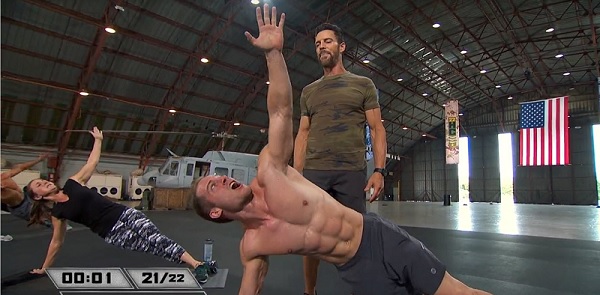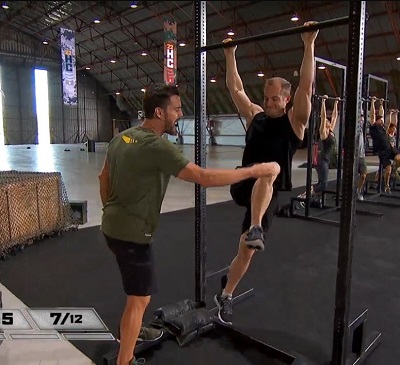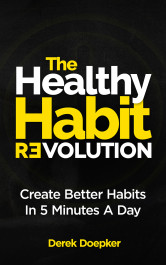The Tug-O-War Of Desires
“I know I’d feel great if I’d exercise… but I just can’t seem to get the motivation to do it.”
Sound familiar?
On one hand you can have this overwhelmingly strong feeling you should exercise. You know you’d be proud of yourself. You’re excited about the thought of looking freakin sexy and feeling awesome…
But… on the other hand it feels like an invisible force is resisting your efforts. Some mental or emotional block keeps you from getting started or sticking with an exercise routine leaving you feeling disappointed with yourself once again.
If this has ever happened to you, consider yourself normal. It’s not that you’re lazy or unmotivated. It’s that you’re not using the right scientifically proven strategies to change your habits.
Here are three big things that are killing your motivation and the tactics to overcome them.
Workout Motivation Killer 1 – Too Easy to Say “No” and Too Hard to Say “Yes”
Have you ever decided to just not go to work one day because you were feeling lazy?
Unless you’re a total slacker, it’s probably not likely. The reason is because there’s a serious and often immediate consequence if you don’t go to work.
What happens if you don’t follow through with your workout?
Maybe there’s a feeling of disappointment in yourself for once again not following through…
But that’s not enough to get you started. No amount of shaming yourself seems to get you to actually get your sh*t together and workout next time you say you’re going to.
Consider this…
What if you had to pay someone $20 for every workout you missed?
Do you think you’d follow through?
The consequence of failure needs to be immediate and compelling.
The flip side of this is you also need to make saying “yes” easier.
I had a gym that would often be closed when I wanted to go, so I made sure I had at home workout routines that I could always do.
I also had quick 10 minute workouts I could do even if I couldn’t do a full workout. This meant saying “yes” to exercising was easier.
Some ways to make saying “yes” easier include:
- Having a proven structured routine that takes guess-work out of it.
- Working out with other people.
- Choosing exercise you enjoy doing like dance.
- Listen to an audiobook while exercising.
- Having quick routines you can do anywhere on busier days.
Action Step
Answer The Following:
- What can you do to make saying “no” to exercise harder?
- What can you do to make saying “yes” to exercise even easier?
Workout Motivation Killer 2 – Identifying With The Resistance You Feel
We all have a voice in our head that pushes us to stay comfortable and casts self-doubt.
This voice gets even stronger if you’ve said you were going to do something in the past and you didn’t follow through.
It may say things like, “Oh… you really think you’re going to stick to an exercise plan this time? Pssh… you’re crazy. You said that before and you totally failed. What makes you think THIS TIME will be any different? You might as well not even bother!”
When we identify with this voice, we say things like, “I’m lazy. I’m unmotivated. I’m probably going to screw this up again.”
Many times we’re not even aware of this voice – we only feel its effects.
The voice can come from a lot of places. For some it’s their past failures, for others it’s a bad experience growing up with exercise so they have all kinds of negative feelings associated with it.
The first thing to recognize though is that this is a normal part of yourself. You’re never going to be free from feelings of resistance and apprehension – especially with something that challenges you.
Since you can’t eliminate this, what you can do is cultivate the other part of yourself that says, “I CAN do this! I WILL be successful! I have what it takes!”
This doubting voice isn’t all bad though…
It likely has an important message to share with you.
It may be saying… “You’ve screwed up in the past. So this time, do something different. Take a smarter approach. Listen to that awesome and sexy Derek Doepker guy because he totally knows what he’s talking about.” 😉
Action Step
- Listen to the voice of resistance and ask what it’s trying to show you.
- Avoid identifying with the resistance and connect with the warrior part of you that can overcome any challenge.
- Act in spite of your feelings of resistance.
Workout Motivation Killer 3 – Expectations
If you had someone force you to give them money, you’d probably resent it and call it robbery. If on the other hand you had a friend that needed help, you may actually enjoy giving them some cash to help out.
In either case you’re losing money, but the first scenario is done by force rather than your own free will.
When we put expectations on ourselves like, “I HAVE TO workout at least 20 minutes a day or I SHOULD workout at least 5 days a week,” we’re creating expectations that not only result in resentment, but also often leads to an all-or-nothing mentality.
“I can’t exercise for 20 minutes today… so screw it I’m not even going to bother.”
These expectations can also build up overtime. While at first it may have been cool to exercise for 5 minutes a day, eventually the pressure to have to do more and more builds up until a person feels they can’t handle it anymore and they quit.
The problem isn’t in having a desire to do more. Striving to improve IS a part of the process. I’m not saying holding yourself to a high standard or expectations is inherently bad.
The distinction is whether or not it’s based on “I HAVE TO/SHOULD” vs. “I WANT to” or “I’m GOING to.”
The key to overcoming expectations is to avoid the language trap of “have tos” and “shoulds” and instead focus on allowing yourself to act.
This can be done with questions like, “Can I just do another 10 minutes of exercise?”
If the answer is no, but you still did something, be proud of what you did accomplish.
Expectations also take the form of expecting a certain result.
A person can look great, but if the scale isn’t changing at the rate they expect it to, they get discouraged.
The key to this is to realize many times these expectations are arbitrary and developed by misleading advertisements that promise unrealistic results.
Ask yourself if what you’re expecting to happen is realistic, and if it is, then the focus goes to diagnosing the issue rather than wasting emotional energy on getting upset about it.
Action Step
- Watch out for “I have to” and “I should” in your language. Replace it with “I choose to” and “Can I just…?”
- Set realistic expectations for what kind of outcomes you can achieve. Seek an expert if you’re not sure what this entails.
Need An Extra Kick In The Ass Of Motivation?
To help you get even more motivation, accountability, and uncover the other hidden things that keep you from exercising every day, I run free online Facebook 7 day healthy habits challenge groups.
For details about my next one, shoot me a message at: info@excuseproof.com










